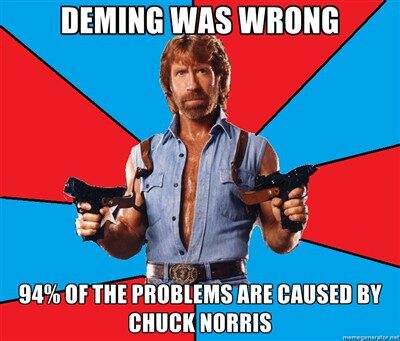Since the webinar I'm doing later today for Gemba Academy (Using SPC to Make Better Management Decisions) allows me to cite the late great Dr. W. Edwards Deming when talking about variation in systems, I thought I'd share this silly graphic that I created. Like the “5 Whys” image from last weekend, it's based on a popular “Internet Meme.”
If you know the “Chuck Norris” jokes (and Dr. Deming's work), you will get it:

See more Lean Memes.
The basis for the joke, other than Chuck Norris being awesome, is Dr. Deming's teaching that 94% of the problems or defects in an organization are caused by “the system.” The traditional management mindset is that errors and defects are caused by bad employees or employees who just don't care.
Systemic problems are caused by things like poor equipment, supplier problems, lack of training, having a culture that places production volume (or patient flow) over quality, things like that.
Note that Dr. Deming never said that 100% of the problems are caused by the system. But, on the flip side, it seems that traditional managers think that 94% of the problems are caused by bad people. It's better to assume that problems are caused by the system, until proven otherwise.
From this website about Deming:
Deming would evoke disbelief in his management seminars when he insisted that 94 percent or more of all problems, defective goods or services came from the system, not from a careless worker or a defective machine. He would go on to say that to improve an organization's goods or services, the system had to be improved rather than searching for the guilty worker or broken equipment. Top managers in America's leading companies were dubious students. But, in almost all cases, when they implemented his ideas, they were surprised to find that they agreed with him: The management and the system they were managing were the true source of both problems and improvements.
Similar themes are found in Lean thinking, the Studer approach, the Just Culture mindsets in healthcare, as well as the quality and patient safety book To Err is Human.
I made more of these meme graphics, as did some other people, including Christina Kach (another guest post is coming from her soon).
I'll eventually create a post full of them. But, for now, you can find them on Twitter under the hashtag #LeanMeme. To create your own, go to the Meme Generator and share it on Twitter (with the hashtag) or email it to me – mark (at) leanblog (dot) org.
You can also see more at the LeanMemes.com website.
Please scroll down (or click) to post a comment. Connect with me on LinkedIn.
Let’s build a culture of continuous improvement and psychological safety—together. If you're a leader aiming for lasting change (not just more projects), I help organizations:
- Engage people at all levels in sustainable improvement
- Shift from fear of mistakes to learning from them
- Apply Lean thinking in practical, people-centered ways
Interested in coaching or a keynote talk? Let’s talk.
Join me for a Lean Healthcare Accelerator Trip to Japan! Learn More










As said on Twitter by @AEnglishIE:
“I only need 1 Key Principle: Constancy of Norris.”
Invasion USA. One of Norris’ classics from the 80s.
You should just write an entire “Lean According to Chuck Norris” Blog Post…
I’m collecting these on a special purpose blog:
http://LeanMeme.blogspot.com
[…] Christina Kach. Read her first contribution here. Today’s post builds on last week’s “Chuck Norris” meme post. And see more “Lean Memes” […]
[…] It is in vogue (in some circles) to claim that “most problems are systemic!” And then mention Deming… […]